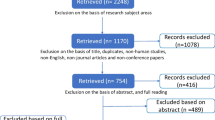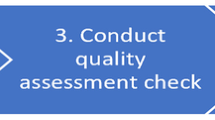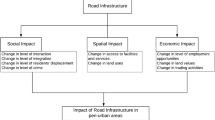Abstract
The growth and socio-economic importance of urban areas is evident and, consequently, its exposure to urban drift and challenges. Interactions of everyday life reflect the production and use of urban space and consequently the need for building and infrastructure developments, essential for facets of urban life. It is argued that the pre-project requirements and the post-project operational requirements of buildings and infrastructure involve complex socio-economic relationships that cannot be ignored. Such relationships involve ownership, users and other parties (e.g. legal and technical). Exploring the complexity in these interdependent relationships inherent in the production and use of urban space is therefore important. It is argued that urban space is a product of complex, often contradictory, social interactions, which are simultaneously social and spatial. However, the intervening agents that shape the built environment and arguably urban space reveal divergent views and conflicting rationalities. Cape Town, South Africa, forms the backdrop for preliminary exploratory studies, which rely on documentary evidence and unstructured interviews with public and private role-players in the society. While Cape Town forms the setting for this study, the subject of discussion is relevant on a global scale. An argument is developed for the need for interdisciplinary cooperation and knowledge sharing among built environment professionals, especially in the pre- and post-project stages of building and infrastructure projects.

Similar content being viewed by others
References
Amin, A. (2016). Urban planning in an uncertain world. In S. S. Fainstein & J. Defilippis (Eds.), Readings in planning theory (4th ed., pp. 156–168). Wiley-Blackwell.
Arefi, M. (2013). Towards a conceptual framework for urban management: The Iranian experience. City, Culture and Society, 4(1), 37–48.
Ashman, S., Fine, B., & Newman, S. (2010). Developmental sate and post-liberation South Africa. In N. Misra-Dexter & J. February (Eds.), Testing democracy: Which way is South Africa going? (pp. 23–46). ABC Press.
Bačlija, I. (2011). Urban management in a European context. Urbani Izziv, 22(2), 137–146.
Bačlija, I. (2014). A reconceptualisation of urban management: The administration of cities, their services, and their growth. The Edwin Mellen Press.
Bahri, A., Brikké, F., & Vairavamoorthy, K. (2016). Managing change to implement integrated urban water management in African cities. Aquatic Procedia, 6(3), 3–14.
Ballard, R. (2015). Geographies of development III:Militancy, insurgency, encroachment and development by the poor. Progress in Human Geography, 39(2), 214–224.
Bayat, A. (2010). Life as politics: How odinary people change the Middle-East. Amsterdam University Press.
Belda-Miquel, S., Peris Blanes, J., & Frediani, A. (2016). Institutionalization and depoliticization of the right to the city: Changing scenarios for radical social movements. International Journal of Urban and Regional Research, 40(2), 321–339.
Berrisford, S. (2014). The challenge of urban planning law reform in African cities. In S. Parnell & E. Pieterse (Eds.), Africa’s urban revolution (pp. 167–183). Zed Books.
Biddulph, M. (2012). The problem with thinking about or for urban design. Journal of Urban Design, 17(1), 1–20.
Boyle, L., & Michell, K. (2017). Urban facilities management: A systemic process for achieving urban sustainability. International Journal of Sustainable Development and Planning, 12(03), 446–456.
CCT. (2018). City of Cape Town Metropolitan Spatial Development Framework. CCT.
Chigbo, N. D. (2014). Management as a factor of production and as an economic resource. International Journal of Humanities and Social Science, 4(6), 162–166.
Cloete, C. E. (2017). Property development in South Africa (3rd ed.). Manplan.
Cockshott, P. (2018). Modes of production. In, [www.youtube.com], https://www.youtube.com/watch?v=HbjZlKqDCMA. Accessed 12 May 2020.
Crush, J., & Frayne, B. (2014). Feeding African cities: The growing challenge of urban food insecurity. In S. Parnell & E. Pieterse (Eds.), Africa’s urban revolution (pp. 110–132). Zed Books.
Currie, P. K., Musango, J. K., & May, N. D. (2017). Urban metabolism: A review with reference to Cape Town. Cities, 70, 91–110.
Cuthbert, A. R. (2008). Urban design: Requiem for an era – review and critique of the last 50 years. Urban Design International, 12(4), 177–223.
De Satge, R., & Watson, V. (2018). Urban planning in the global south: Conflicting rationalities in contested urban space. Palgrave Macmillan.
Didier, S., Peyroux, E., & Morange, M. (2012). The spreading of the city improvement district model in Johannesburg and Cape Town: Urban regeneration and the neoliberal agenda in South Africa. International Journal of Urban and Regional Research, 36(5), 915–935.
Ding, C., Lai, S., & Wang, M. (2012). Global urbanization and urban management. Journal of Urban Management, 1(1), 1–2.
Du, R. (2016). Urban growth: Changes, management, and problems in large cities of Southeast China. Frontiers of Architectural Research, 5(3), 290–300.
Duminy, J., Odendaal, N., & Watson, V. (2014). The education and research imperatives of urban planning professionals in Africa. In S. Parnell & E. Pieters (Eds.), Africa’s urban revolution (pp. 184–199). Zeb.
du Plessis, D. J. (2014). A critical reflection on urban spatial planning practices and outcomes in post-apartheid South Africa. Urban Forum, 25, 69–88.
Enshassi, A., Kochendoerfer, B., & Ghoul, H. A. (2016). Factors affecting sustainable performance of construction projects during project life cycle phases. International Journal of Sustainable Construction Engineering and Technology, 7(1), 50–68.
Fox, S. (2014). Urbanisation as a global historical process: Theory and evidence from sub-Saharan Africa. In S. Parnell & E. Pieterse (Eds.), Africa’s urban revolution (pp. 257–283). Zed Books.
Gottdiener, M. (1993). A Marx for our time: Henri Lefebvre and the production of space. American Sociological Society, 11(1), 129–134.
Gottdiener, M. (1994). The social production of urban space. University of Texas Press.
Grimshaw, B. (2004). Space place and people: Facilities management and critical theory. In K. Alexander, B. Atkin, J. Bröchner, & T. Haugen (Eds.), Facilities Management inovation and performance (pp. 15–31). Spon Press.
Harrison, P., & Todes, A. (2015). Spatial transformations in a ‘“loosening state”’: South Africa in a comparative perspective. Geoforum, 61, 148–162.
Harvey, D. (1985). The urbanization of capital: Studies in the history and theory of capitalist urbanization. John Hopkins University Press.
Kotze, N. (2013). A community in trouble? The impact of gentrification on the Bo-Kaap. Cape Town. Urbani Izziv, 24(2), 124–132.
Lefebvre, H. (1991). The production of space. Blackwell.
Lefebvre, H. (2003). The urban revolution. University of Minnesota Press.
Marx, K. (1857). Grundrisse. Penguin.
Masoumi, H. E., Hosseini, M., & Gouda, A. (2018). Drivers of urban sprawl in two large Middle-Eastern countries: Literature on Iran and Egypt. Human Geographies - Journal of Studies and Research in Human Geography, 12(1), 55–79.
Mattingly, M. (1994). The meaning of urban management. Cities, 11(3), 201–205.
McGill, R. (1998). Urban management in developing countries. Cities, 15(6), 463–471.
Mchunu, K. (2016). Urban planning and sustainability in South Africa. In R. Zetter & G. B. Watson (Eds.), Designing sustainable cities in the developing world (pp. 121–131). Routledge.
Morange, M., & Spire, A. (2019). The right to the city in the Global South. African appropriations and adaptation. In: Cybergeo: European Journal of Geography, Space, Society, Territory [Online] http://journals.openedition.org/cybergeo/32217. Accessed 2 Dec 2019.
Morange, M., Pilo, F., & Spire, A. (2018). Experiencing regularisation in Accra, Cape Town and Rio de Janeiro. City, 22(5–6), 685–702.
Müller, F. (2019). A performative approach to urban informality: Learning from Mexico City and Rio de Janeiro. Anthropologica, 61(1), 64–77.
Njoh, A. J. (2009). Urban planning as a tool of power and social control in colonial Africa. Planning Perspective, 24(3), 301–317.
Njoh, A. J. (2016). Tradition culture & development in Africa Heritage culture and identity. Routledge.
Odendaal, N., & McCaan, A. (2016). Spatial planning in the global South: Reflections on the Cape Town spatial development framework. International Development Planning Review, 38(4), 405–423.
Onibokun, A.G. (1997) Governance and urban poverty in Anglophone West Africa. In: Swilling, M. (Ed.), Governing African Cities (pp. 85–114). Witwatersrand University Press.
Ordor, U., & Michell, K. (2019). ‘Exploring the challenges in the interface between urban design and urban management in South Africa: A socio-spatial dialectic approach’, In: Proceedings of CIB World Building Congress Constructing Smart Cities, June 17–21 2019, 2970–2980. Available at: https://www.polyu.edu.hk/bre/docdrive/CIBWBC2019/proceedings.html. Accessed 17 June 2019.
Oyesiku, O. O. (2010). New cities in urban and regional development planning. Longman.
Parnell, S., & Pieterse, E. (2010). The ‘right to the city’: Institutional imperatives of a developmental state. International Journal of Urban and Regional Research, 34(1), 146–162.
Pieterse, E., & Parnell, S. (2014). Africa’s urban revolution in context. In S. Parnell & E. Pieterse (Eds.), Africa’s urban revolution (pp. 1–17). Zed Books.
Rakodi, C. (2001). Forget planning, put politics first? Priorities for urban management in developing countries. International Journal of Applied Earth Observation and Geoinformation, 3(3), 209–223.
Schmid, C. (2008). Henri Lefebvre’s theory of production of space: Towards a three-dimensional dialectic. In K. Goonewardena, S. Kipfer, R. Milgrom, & C. Schmid (Eds.), Space, difference, everyday life - reading Henri Lefebvre (pp. 27–45). Routledge.
Smit, S., & Musango, J. K. (2015). Towards connecting green economy with informal economy in South Africa: A review and way forward. Ecological Economics, 116, 154–159.
Smit, S., Musango, J. K., Kovacic, Z., & Brent, A. C. (2017). Conceptualising slum in an urban African context. Cities, 62, 107–119.
Soja, E. W. (1980). The socio-spatial dialectic. Association of American Geographers, 70(2), 207–225.
Stren, R. (1993). ‘Urban management’ in development assistance: An elusive concept. Cities, 10(2), 125–138.
Todes, A. (2017). Shaping peripheral growth? Strategic spatial planning in a South African city-region. Habitat International, 67, 129–136.
Tosics, I. (2013). From socialism to capitalism: The social outcomes of the restructuring of cities. In: Carmon, N. & Fainstein, S.S. (Eds.), Policy, planning and people, 1st edn. (pp. 75–100). University of Pennsylvania Press.
Turok, I. (2014). Linking urbanisation and development in Africa’s economic revival. In S. Parnell & E. Pieterse (Eds.), Afrca’s urban revolution (pp. 60–81). Zed Books.
Turok, I. (2015). The dual economy and spatial inequalities in South Africa. In B. Turok (Ed.), Changing the colour of capital (pp. 87–97). David Philip.
van Dijk, M. P. (2006). Managing cities in developing countries: The theory and practice of urban management. Edward Elgar Publishing.
Watson, V. (2003). Conflicting rationalities: Implications for planning theory and ethics. Planning Theory & Practice, 4(4), 395–407.
Watson, V. (2012) Conflicting rationalities in Cape Town: Power at the interface [Online video file, 7–8 March]. Available: https://www.youtube.com/watch?v=eY8wscH8TT0 [2019, November 28]
UN-Habitat (2016). Urbanization and development: Emerging futures. Nairobi: United Nations Human Settlements Programme (UN-Habitat).
Werna, E. (1995). The management of urban development, or the development of urban management? Problems and premises of an elusive concept. Cities, 12(5), 353–359.
Wilhelm, S. (2018) Maiden’s Cove development under fire: from News 24. Available: https://www.news24.com/news24/southafrica/news/maidens-cove-development-under-fire-20180905 [2021, May 7]
Windapo, A. (2012). Construction Technology I: Part A & B [OER]. University of Cape Town, Faculty of Engineering & the Built Environment, Department of Construction Economics and Management. Available: http://hdl.handle.net/11427/250. Accessed 1 Dec 2020.
WorldBank. (2001). World Development Report 2000/2001: Attacking Poverty. World Bank.
Wyk, J. V., & Oranje, M. (2014). The post-1994 South African spatial planning system and Bill of Rights: A meaningful and mutually beneficial fit? Planning Theory, 13(4), 349–369.
Author information
Authors and Affiliations
Corresponding author
Additional information
Publisher's Note
Springer Nature remains neutral with regard to jurisdictional claims in published maps and institutional affiliations.
Rights and permissions
About this article
Cite this article
Ordor, U., Michell, K. Exploring Interdisciplinary Cooperation in the Relationship Between Urban Management Strategies, Modes of Production and the Production of Urban Space in Cape Town, South Africa. Urban Forum 33, 153–171 (2022). https://doi.org/10.1007/s12132-021-09439-3
Accepted:
Published:
Issue Date:
DOI: https://doi.org/10.1007/s12132-021-09439-3




